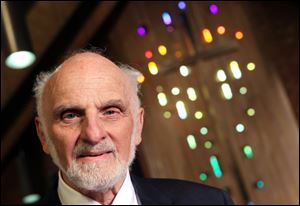
RELIGION
Rev. Walter Brueggemann draws parallels from today’s society to ancient times
1/11/2014
Walter Brueggemann
The Rev. Walter Brueggemann has a solid reputation as an Old Testament scholar. His approach to the Bible brought a fresh perspective to scripture studies, but he says what made him prominent is “probably my long life. You stay at it long enough and you're compulsive enough to keep working at it, the stuff accumulates.”
And it did accumulate. Mr. Brueggemann, who lives in Cincinnati, is the author or coauthor of more than 75 books. Some relate Biblical times to today's society, others are commentary on and interpretation of Old Testament books, and there are also collections of sermons and a couple of books on preaching.
Truth Speaks to Power: The Countercultural Nature of Scripture is Mr. Brueggemann's current book, published in 2013. Three books, including a commentary on Psalms for which he and William H. Bellinger, Jr., are coauthors and which is coming into print four years after he finished work on it, are on the publication schedule for the next two months.
In Sabbath as Resistance: Saying No to the Culture of Now, “I'm trying to make the argument that sabbath is a refusal to have one's life defined by production and consumption,” he said. “We live in a 24/7 society in which you've got to be productive all the time, and I think that ancient resistance” of sabbath, which “before it was worship it was simply work stoppage,” applies today. That book will be published Jan. 31.
Reality, Grief, Hope: Three Urgent Prophetic Tasks, to be published Feb. 28, is the topic for the first of three talks he will give Jan. 18 and 19 at Sylvania United Church of Christ, 7240 Erie St., Sylvania, as part of the church's Bill Chidester Lecture Series.
Those tasks of the church, Mr. Brueggemann said, are “to tell the truth in a society that lives in illusion, to grieve loss in a society that practices denial, and to express hope in a society that lives in despair.” He said that both the society of ancient Israel and today's society are ones of illusion, denial, and despair. With that idea, in his book he looked for prophetic voices among today's poets to draw a parallel to ancient prophecy. Mr. Brueggemann chose poets, he said, because “they work below the radar of a memo-writing society.”
On Jan. 19, Mr. Brueggemann will preach, lecture, then preach again. He is a United Church of Christ minister as well as an author and retired professor. The title of the sermon he will deliver at both the 8:30 and 10:40 a.m. services is “Talking and Walking with an Open Ear.” “It has to do with listening and paying attention and responding to what's in front of us in the world,” Mr. Brueggemann said.
Between the services, at 9:20 a.m., he'll speak about “Competing Tilts in Covenental Faith.”
“What I'm going to talk about in that presentation,” Mr. Brueggemann said, “is that in the Old Testament you can trace an unconditional and a conditional covenant, and one is attached to Abraham and one is attached to Moses, and they're in considerable tension with one another.” People today “pick and choose” which covenant to follow, he said, with the conditional one applied to people “with whom we disagree,” and “we who are well off claim the unconditional for ourselves.”
Mr. Brueggemann's “accent on imagination” and attention to truth-telling as illustrated by prophets who are counter to the culture might be more relevant to his standing as an author than just that “stuff accumulates.” Giving attention to imagination and applying the Old Testament to contemporary society “was a kind of a response to historical criticism,” he said. “Biblical interpretation required a lot of imagination and not just historical references.”
The “narratives and images and metaphors” in the Bible “are endlessly evocative of more meaning,” he said, but the history of the Church shows an effort to “get it to one meaning.” Theologically, imagination “is the work of the spirit, a way to talk about the work of the spirit in the sense that every good artist says he or she is inspired, so art depends on imagination.
“The whole cluster of notions has been important to me as I interpret scripture,” he said.
The Jan. 18 lecture, from 4 to 5:30 p.m., with a time for questions, costs $10. The three Jan. 19 events—the lecture and the two worship services—are open to all.
Contact TK Barger @ tkbarger@theblade.com, 419-724-6278 or on Twitter @TK_Barger.